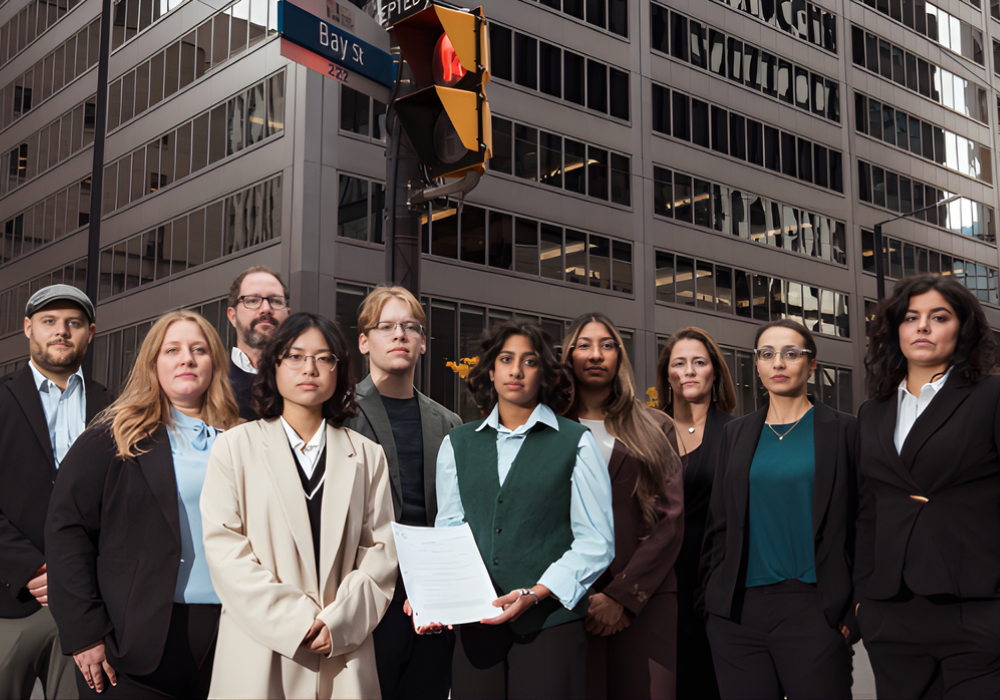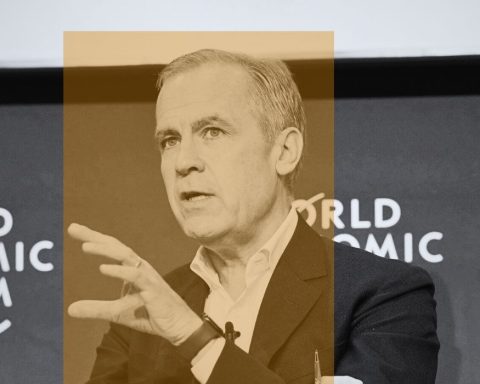What will Canada look like in 2050? Will we see a blue-sky future powered by renewable energies? Or a dysfunctional dominion of rising temperatures, burnt-out forests, extreme weather and drought?
Those questions go to the heart of this week’s court action by four young Canadians against the world’s sixth-largest pension fund manager, the Canada Pension Plan Investment Board. CPP Investments manages the retirement savings of 22 million Canadians, an ever-growing money pot currently worth more than $750 billion. With a licence to invest those funds into high-return opportunities anywhere in the world, the CPPIB doesn’t just invest in the future – its decisions help shape the future.
The primary duty of any pension manager is to serve the interests of contributors, whether they’re near retirement age of just starting in the workforce. On October 27, four young people who will be retiring after 2050 (the year by which the United Nations hoped to achieve net-zero emissions) announced they are suing the CPPIB for mismanagement of climate risks. They claim that the fund’s continuing investment in fossil-fuel companies delays the energy transition and risks their financial futures.
According to the Toronto not-for-profit Shift Action for Pension Wealth and Planet Health, the CPPIB may have breached its legal duties “by subjecting pension contributions to undue risk of loss from poorly managed climate risk.” The proponents aren’t suing for compensation; their goal is to nail down the meaning of “undue risk” and ensure that the board “does a better job of managing the long-term financial risks of climate.”
Underestimating the risks
Toronto-based Ecojustice, which is representing the four applicants along with Goldblatt Partners, has published a critique of CPP Investments’ “transition risks” model that claims that the pension fund is not accounting for all the long-term negative effects of climate change, “including irreparable loss.” The CPPIB’s worst-case scenario estimates that a “hothouse” world in 2050 would reduce investment returns by just 4%.
“That looks like a wild under-estimate to me,” says Shift senior manager Patrick DeRochie. “You can’t diversify your way out of three degrees of warming. It will become impossible for pension funds to create returns if we fail to get the climate crisis under control.”
“The way CPP Investments is assuming climate risks is not in line with their fiduciary duties. Fossil fuels are a very short-term investment vehicle. By the time I retire, those investments will either be outdated, or the whole economy will have tanked.
– Travis Olson, plaintiff
One applicant in the suit puts things in simpler language. “Every payday, CPP Investments is using our mandatory pension contributions to fund fossil fuels and worsen the climate crisis,” alleges Aliya Hirji, a 20-year-old self-described community activist who has engaged with climate issues for six years. “By underestimating climate-related financial risks, CPP Investments risks exposing us to reduced retirement benefits, higher contribution rates – or both. We could end up paying more than previous generations and getting less back when it’s our turn to retire.” (Hirji was recognized by Corporate Knights in 2021 as one of Canada’s 30 Under 30 sustainability leaders.)
The four applicants – Hirji, from Vancouver; Rav Singh and Chloe Tse, from Ontario; and Travis Olson, from Alberta – met for the first time this month just prior to filing the lawsuit. Their filing alleges that CPP Investments lacks adequate measures to manage climate-related financial risks.
CPPIB’s commitment to oil and gas
At a time when the Trump administration is working hard to discredit green energy and revive the lagging prospects of the oil, gas and coal sectors, CPP Investments has been surprisingly willing to follow Trump’s lead. In recent months, it has promoted its investment in Canada’s largest oil and gas producer, Canadian Natural Resources, as a model of “long-term partnership and value creation”; it has supported investee companies’ plans for new gas plants and pipelines; and its 11%-owned California Resources Corp. has pushed for looser climate and environmental regulations so it can do more drilling.
Most importantly, last May CPP Investments quietly backed off its 2022 commitment to achieve net-zero greenhouse gas emissions by 2050. “Forcing alignment with rigid milestones could lead to investment decisions that are misaligned with our investment strategy,” the board claims. It prefers to focus “on delivering results, not managing legal uncertainty.”
Here’s how Shift reported on that reversal: “This unacceptable abdication of responsibility by CPPIB stands in stark contrast to other Canadian pension giants, six of which released annual reports this year that unambiguously confirmed that they remain committed to net-zero by 2050.”
The authentic risks from climate change
Scientific consensus maintains that a failure to hold the rise of global average temperatures to below 1.5°C by 2050 will result in significant climate disruptions, reducing crop production and turning arable and forest lands into deserts. “Our case is alleging that CPP Investments is mismanaging our pension fund by failing to adequately respond to climate change,” says applicant Singh. “We should all be concerned that our CPP benefits may not be as dependable as we’d like to think.”
Indeed, CPP Investments may not be the only pension fund underestimating climate risks. A January 2025 report on Planetary Solvency by risk-management experts at the United Kingdom’s Institute and Faculty of Actuaries found that most policy-making organizations are using analytical methodologies that understate the economic risks of climate change. By ignoring “tipping points” such as soil degradation or the melting of Greenland’s ice sheets, “they often exclude many of the most severe risks that are expected and do not recognize there is a risk of ruin.”
The report’s own findings point to a 50% contraction in economic activity between 2070 and 2090, “unless an alternative course is [charted].”
Ironically, the four youths’ suit was announced on October 27, the same day UN Secretary-General António Guterres urged world nations to “recognize our failure” to hit the 1.5°C target. “It is absolutely indispensable to change course in order to make sure that the overshoot is as short as possible and as low in intensity as possible,” he told The Guardian. “We don’t want to see the Amazon as a savannah. But that is a real risk if we don’t change course and if we don’t make a dramatic decrease of emissions as soon as possible.”
CPPIB plays hardball
Reacting to the suit, CPP Investments wrapped itself in the flag. “An action against CPP Investments and its efforts to maintain the sustainability of the CPP is an action against the retirement security of 22 million Canadians,” the fund wrote in a note following the announcement of the lawsuit. “We intend to do whatever is needed to uphold their interests.”
Applicant Travis Olson, a 22-year-old retail worker and labour activist in Alberta, was surprised to see CPP Investments play hardball. “It’s really disappointing to be sent a response like that to such a serious case.” He says the four are acting in the long-term interests of Canadians – not against them.
RELATED
Canada’s largest pension fund walks away from net-zero target
Most Canadian pension funds recognize the urgency of climate change. Some really don’t.
Canada’s finance regulator says up to $1 trillion in lending could be unlocked
“The way CPP Investments is assuming climate risks is not in line with their fiduciary duties,” Olson alleges. Given the increasing cost-effectiveness of renewables, “fossil fuels are a very short-term investment vehicle. By the time I retire, those investments will either be outdated, or the whole economy will have tanked.”
Advisers to the group of four declined to discuss how the youths were selected for this ambitious test case. Karine Peloffy, Ecojustice’s sustainable finance lead, would only discuss the applicants to say, “They’re lovely individuals. They’re passionate, dedicated, and they’re asking good questions.”
For his part, Olson insists that he and his colleagues are more than just a front for activist Toronto lawyers. “Yes, we’re working with them. But we’re the ones in the driver’s seat.”
Rick Spence is the editor-at-large at Corporate Knights. He is based in Toronto.
The Weekly Roundup
Get all our stories in one place, every Wednesday at noon EST.







